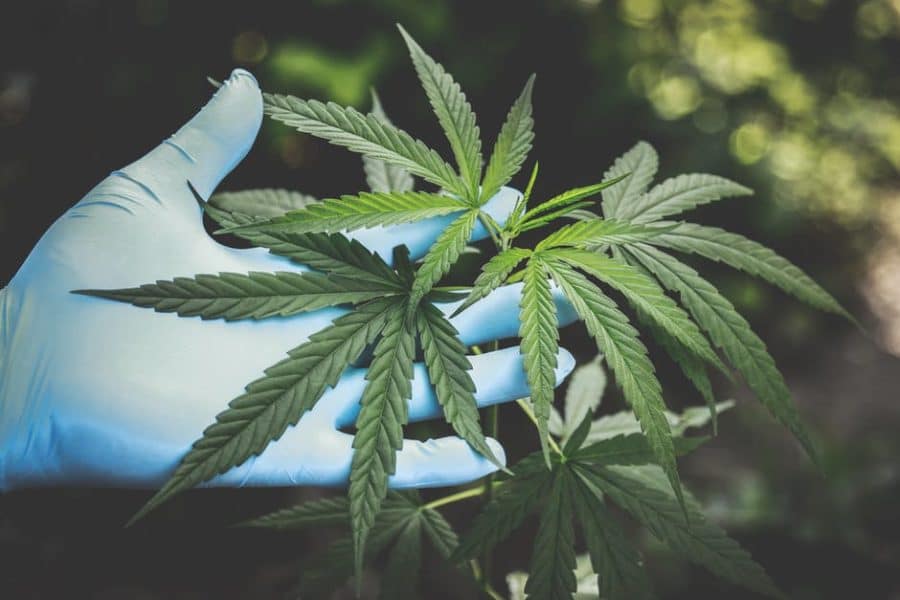Legal marijuana sales for recreational use began Jan. 1 in Colorado and the state expects $578 million in annual sales to generate $67 million in tax revenue, according to Bloomberg News. Sales in Washington are expected to begin later this year. These new laws suggest that this is just the beginning, opening the doors for other states to legalize recreational marijuana. Here are a few states that may be next in line.

Alaska
Alaska doesn’t have a bill out there, but an upcoming petition deadline looks like it will easily surpass its 31,169-name goal on Jan. 21. After a ballot measure to tax and regulate cannabis for adult recreational use was certified in June, organizers have collected nearly 45,000 signatures of registered Alaska voters to ensure that the initiative receives a vote in the August primaries.
While it decriminalized private possession of up to four ounces and 24 noncommercial plants in 1975, the ruling has been tossed back and forth ever since. It is currently approved for medical use, but the rules have been fuzzy and inconsistently reinforced for the past 23 years. A 2014 vote will mean a more sensible and consistent marijuana policy.
Arizona
Measure: Proposed Ballot Measure for Constitutional Amendment
Author: Safer Arizona Committee
Noteable differences:
Safer Arizona is sponsoring an initiative to amend the Arizona state constitution to allow for legal, taxed, and regulated marijuana/cannabis/industrial hemp use and commerce. The initiative was filed in June 2013 and they have until July 3rd to gather over 300,000 valid voter signatures in order to qualify for the November 2014 ballot.
The initiative includes possession of up to 2.5 ounces of marijuana and most notably, up to 12 plants for those ‘of voting age.’
The initiative may be beaten to the punch, however, as Assistant House Minority Leader Ruben Gallego announced plans in November to introduce a marijuana-legalization bill during the upcoming legislative session. Gallego says the bill “would regulate and tax marijuana in a manner similar to alcohol.” Under Gallego’s proposal, the possession of up to an ounce of cannabis, and the private cultivation of up to 5 plants, would no longer be illegal, and state-licensed retail outlets would be authorized.
California
Of all the states vying for legalization in 2014, California is leading the race. With three initiatives pending approval, it’s only a matter of time before one of them ends up on the a ballot. 2014 may be the year, but without proper support some are suggesting it may be delayed until 2016.
Marijuana has already been decriminalized and legalized for medical use in California. Nearly two-thirds of Californians support legalizing pot.
Measure: California Cannabis Hemp Act of 2014
Author: California Cannabis Hemp Initiative 2014
Noteable differences:
The California Cannabis Hemp Initiative 2014 is currently in the signature-gathering phase, and will need to submit nearly 500,000 signatures by February 24th.
While the initiative does not address specific parameters for possession of cannabis or plants, it permits use by those of 21 years and older, eliminates unfair drug testing, includes a 50% excise tax on commercial marijuana and prohibits taxation of medical marijuana.
Measure: Marijuana Control, Legalization and Control Act of 2014
Author: Californians for Marijuana Legalization & Control
Noteable differences:
Described by its proponents as “the world’s first open source initiative,” MCLR is pending approval at the attorney general’s office after its proponents handed in its second amended version in late October. This initiative also does not call for specific possession amounts, except in regard to plants – no more than 12, with a maximum of 6 mature plants. Rather, MCLR aims to prevent distribution to minors and profits from going to criminal enterprises.
Measure: Control, Regulate and Tax Marijuana Act
Author: Drug Policy Alliance
Noteable differences:
Just like the California Cannabis Hemp Initiative, the Control, Regulate and Tax Marijuana Act is in the signature-gathering phase of approval in order to make it onto the 2014 ballot. A glitch in wording, originally written that those under 21 ‘may’ be prohibited from consuming marijuana needed to be changed to ‘shall.’ As a result, the initiative may not have enough momentum to make the deadline.
The Control, Regulate, and Tax Marijuana Act would legalize up to one ounce of marijuana or one-eighth of an ounce of concentrated cannabis for those 21 years and older and create a statewide system of regulated marijuana commerce. It would also impose a 25% tax on retail sales.
Oregon
Measure: Control, Regulation, and Taxation of Marijuana and Industrial Hemp Act
Author: New Approach Oregon
Noteable differences:
Oregon’s House Judiciary Committee passed House Bill 3371 in April 2013 (which would provide for the regulation of production, processing and sale of marijuana and marijuana-infused products), making it one of the first first statewide legislative committees in U.S. history to approve a proposal specifically legalizing the possession, use and sale of recreational cannabis. Unfortunately the bill stalled in its next committee; however, advocates continue to push for a proposal for 2014.
New Approach Oregon filed a 35-page marijuana legalization initiative in October to be placed on the ballot in 2014. The following month, Oregon Senate Judiciary Chairman Floyd Prozanski presented draft legislation that would ask voters if they want to legalize marijuana for 21-and-over adults and let the Legislature work out the details later.
Should the New Approach Oregon initiative Act pass, it has the potential to be one of – if not the best marijuana legalization model in the nation. The initiative would allow possession of up to 8 ounces of dried marijuana rather than the typical 1 ounce, and includes specific possession limits for solids and liquids, 16 ounces and 72 ounces respectively. Additionally, the Act allows for 4 plants. While Colorado currently allows 6, Oregon has nearly perfect conditions for growing outdoors, which would likely yield a larger crop than indoor-grown plants. Still, the initiative may be amended to include higher cultivation limits.
Medicinal marijuana was authorized by legislation for licensing and dispensary regulation in August 2013.
Maine
The Maine State Legislature failed to pass a bill for a third time in November that would have legalized, taxed and regulated recreational marijuana for adults. However, the Marijuana Policy Project has announced plans to help coordinate a campaign to get a legalization measure on the ballot in 2016.
Currently, Maine is a “decrim” state. In 2009, the Maine Legislature passed a measure that expanded the state’s decades-old decrim law by making possession of up to 2.5 ounces of marijuana a civil penalty, punishable by only a civil fine. The state’s medical marijuana law passed in 2009.
Incidentally, the city of Portland voted in November to make possession of 2.5 ounces of marijuana legal for adults 21 years of age or older, and the ordinance was effective December 6. Despite the fact that 67% of Portland voters voted in favor of the ordinance, the city police chief recently announced that the police will continue to enforce state law. However, with Portland now on the map as the first city on the East Coast to legalize adult marijuana possession, it is well positioned to pass a law in Maine that would tax and regulate marijuana statewide by 2016.
Massachusetts
Despite the fact that Massachusetts appears primed to be the next state with an initiative, a previous bill was killed in committee and there are no campaigns for a ballot initiative at this time.
Massachusetts is a decriminalized state and passed a ballot measure legalizing it for medical use in 2012. A February PPP poll found that 58 percent of the state’s residents would be in favor of legalizing, taxing and regulating cannabis.
Maryland
The Maryland legislature considered a bill to make marijuana legal in 2013. This bill would have removed all criminal penalties for the use and possession of up to an ounce of marijuana by adults 21 and over and would have taxed and regulated marijuana in a manner similar to alcohol. The House Judiciary Committee failed to take action before the deadline. Meanwhile, the Senate voted 30 to 16 to decriminalize possession of small amounts of marijuana, but the measure died in the House.
Despite the lack of any ballot initiative or government bill on record for 2014, Maryland is gaining daily support for a future measure. Senate President Thomas V. Mike Miller Jr. said that he would support legislation allowing the regulated sale of marijuana similar to Colorado. And Governor candidate Heather Mizeur announced a plan in November to legalize, regulate and tax marijuana in a way similar to how the state regulates alcohol in order to provide the state with increased revenue and enhance public safety.
Montana
Measure: Constitutional Initiative No. 111
Sponsor: Barb Trego
Noteable differences:
Just 10 days after a 2012 ballot measure fell short, Montana marijuana activists submitted the first ballot issue for the 2014 election. The proposed amendment to Article II, Section 14, of the Montana Constitution establishes that “adults have the right to responsibly purchase, consume, produce, and possess marijuana, subject to reasonable limitations, regulations and taxation. Except for actions that endanger minors or public safety, no criminal offense or penalty of this state shall apply to such activities. Federal criminal laws regarding marijuana will not be changed by the passage of this initiative. This initiative, if passed by the electorate, will become effective on July 1, 2015.
To qualify for the ballot, initiative organizers must obtain the signatures of 10% of qualified voters, as well as 10% of qualified voters in each of the state’s 40 legislative House districts. Fortunately this time around, organizers have more time.
Marijuana possession for non-medical use is still a criminal offense in the state, and the state has passed a variety of ill-conceived and unscientific laws in the recent past. Reform advocates still remain hopeful that voters will support full legalization.
Rhode Island
There are no current initiatives on deck for 2014, either for a ballot vote or via legislation. However, marijuana advocates are hopeful that Rhode Island will be one of the first in the next round of states to legalize.
A marijuana legalization bill has been introduced during the last three sessions in the Rhode Island General Assembly, with the most recent introduced in the 2013 session. Though the legislature adjourned before voting on the bill, the legislation could have legalized the sale and consumption of marijuana for adults ages 21 and over.
Rhode Island decriminalized less than an ounce of marijuana in April 2013 and a survey for the Marijuana Policy Project by Public Policy Polling found that 52 percent of Rhode Islanders would support treating cannabis no differently than alcohol.
Vermont
Measure: Senate Bill 306
Author: Sen. David Zuckerman
Noteable differences:
Vermont has seen steady progress in it’s attempts to scale back marijuana prohibition. Medical marijuana is legal and last year a bill was passed to establish a system of dispensaries for patients. There was also a successful measure to decriminalize small amounts of cannabis, which went into effect in July.
But a new bill introduced by Senator David Zuckerman as a last-minute filing on Jan. 1st could change that.
Zuckerman’s bill would create a framework for the wholesale and retailing of marijuana under the authority of the state’s Liquor Control Board. The bill imposes a $50 per ounce excise tax on all sales and allow over 21 to possess two ounces or three plants.
Incidentally, a similar bill was introduced last year and is currently sitting in the House. Senate Bill 160 was introduced by Senators Jeanette White and Joe Benning to create a joint study committee to provide recommendations to the General Assembly on the legalization, regulation and taxation of marijuana in Vermont.
Still, Zuckerman says the timing isn’t right for passage this year, despite that being the ultimate goal. The Washington DC-based Marijuana Policy Project said it would not push for recreational marijuana in Vermont this year either, aiming instead for legalization in 2015.






That’s an interesting view, thanks for sharing.
That’s interesting, thanks for sharing.